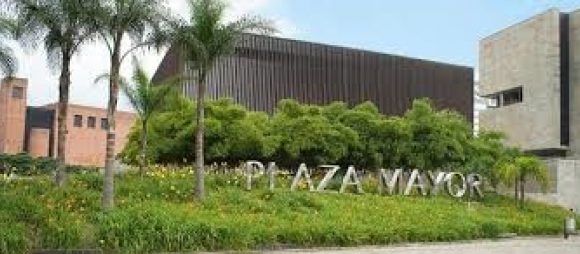Ex-U.S. President Bill Clinton Praises Medellin’s Turnaround at World Coffee Producers Forum

Former U.S. President Bill Clinton told an overflow audience for the first-ever World Coffee Producers Forum July 11 that Medellin’s transformation from the world’s most violent city 25 years ago to a global leader in social innovation and progress might foretell what Colombia as a whole eventually could become.
Holding the prestigious World Coffee Producers Forum in Medellin would have been “unthinkable” in years past, because of the city’s bad reputation, he said. But Medellin — where Colombia’s Federacion Nacional de Cafeteros (the coffee-growers’ trade group) was born 90 years ago — has since become a beacon for hope, he added.
“Colombia could be unrecognizable in 20 years — in a good way,” if wise social policy and “smart” investment continue to build upon the example that Medellin has set in recent years, Clinton told an overflow crowd of more than 1,000 forum delegates from 40 countries at the InterContinental Hotel here in Medellin.
Clinton likewise praised Medellin’s pioneering development of novel public-transit systems, which include outdoor escalators in mountainside neighborhoods, aerial trams, Metro rail, bus rapid transit (BRT) and free bicycles — mainly serving the poorer and middle-class sectors of the city.
Positive results from “smart” urban social policy and investment similarly could be replicated via “smart” investment and development in rural areas – not just in the surrounding Antioquia department (which today has more than 80,000 coffee farmers) but also elsewhere in Colombia and world-wide, Clinton added.
Citing improvements from recent Clinton Foundation projects in Indonesia and Africa, Clinton pointed out that “smart” rural development — using coffee as an “anchor” crop — has been proven to reduce social conflicts and violence.
Expansion of “smart” coffee development in Colombia likewise could help to reduce coca-plantation acreage — and the related violence and narco-trafficking that accompany coca production, he added.
What’s more, such “smart” coffee development also can help reduce deforestation, which has helped to preserve Colombia’s world-leading diversity in birds and orchids, Clinton added. Such preservation of forests, flowers and wildlife also can deliver big gains in profitable ecotourism, as Costa Rica has shown, he said.
However, Clinton cautioned that “smart” coffee development ought to incorporate crop diversification — so that farmers don’t become too reliant on a single commodity that has a long history of price volatility.
This cautious message about over-reliance on coffee stood in contrast to emotional pleas here from presidents of several nations as well as producer-association leaders, all of whom urged the launch of aggressive campaigns aiming to convince multinational coffee buyers to redistribute a greater portion of their profits to coffee producers.
For example: Colombian President Juan Manuel Santos stated here that a cup of coffee retailing for US$3.50 at upscale coffee shops in Europe or the USA only nets Colombian coffee producers about US$0.05 – an “obnoxious” differential in share-of-profits, he said.
Columbia University (New York) economics professor Jeffrey Sachs added in a keynote presentation here that doubling this US$0.05 producer share-of-profits to US$0.10 (per cup of coffee) would make a huge difference for producer sustainability, while hardly affecting consumers.
While some sort of future, global agreement among coffee producers to restrict output theoretically might improve producer margins, it’s practically impossible to get the 60 producer nations to agree, Santos said — citing the failed “Pancafe Fund” initiative of decades past.
While wholesale buyers of coffee today may enjoy relatively low acquisition costs, global coffee inventories have been declining as many former producers have quit the business, citing unsustainable margins and declining availability of farm-workers, Santos warned.
As a result, coffee today is more vulnerable to price spikes – which could result from (for example) a potentially disastrous frost event in Brazil, the world’s biggest-volume producer, he said.
“It’s in the interest of everybody [in the global coffee chain] for a friendly agreement to pay a better price to producers,” Santos argued. “And the social benefits to the world’s 25 million coffee farmers would be enormous.”
Meanwhile, the recent “peace” agreement between the narco-terrorist FARC organization and Colombia’s government opens big opportunities for future rural investment, Santos said.
Such investment potentially could boost Colombian coffee output from the 14 million bags/year (each bag weighing 132 pounds) sold in 2016 to 18 million or even 20 million bags/year, he said.
While “global warming” could hurt future global coffee production because of an increase in damaging rains, hail, droughts or crop diseases, Andean coffee producers including Colombia, Ecuador and Peru are seen as less-vulnerable to such impacts than relatively low-lying Brazil, Santos added.
Starbucks, USAID Team-up to Help Colombian Coffee Farmers
On a related front, U.S.-based global coffee retail giant Starbucks announced July 10 in Medellin that it’s contributing US$2 million to programs in partnership with the United States Agency for International Development (USAID) and the Interamerican Development Bank (IDB) to provide skills training and technological tools to 1,000 young coffee farmers and also help smallholder female coffee growers in Colombia’s “post-conflict zones.”
Both of these partnerships will advance the work of the Starbucks “Farmer Support Center” in Colombia, which opened in 2012 “to help connect farmers with trained agronomists and technical assistance, and expand its ‘C.A.F.E. Practices’ program, which is Starbucks’ third-party verified sustainability program developed with Conservation International more than 15 years ago,” according to the company.
The USAID public-private partnership in Colombia first started in 2013 with a $1.5 million investment, according to Starbucks. That program “has helped positively impact 20,000 farmers and expanded the collaborative program to the Tolima, Cauca, Valle and Antioquia growing regions to benefit up to 10,000 more coffee farmers,” the company added.
















